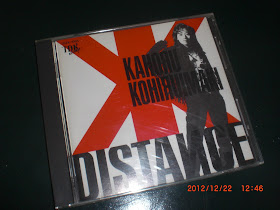Mariya was joined in the recording booth by Tatsuro Yamashita(山下達郎) and SMAP's Takuya Kimura(木村拓哉), something that the singer notes near the end of the song. According to Mariya's description of the song in 2008's "Expressions", she put in the nickname (Kimutaku) of the increasingly popular heartthrob member of the Johnny's Entertainment boy band while writing up the song and thought of inviting the man himself into the recording. Not sure but there may have been a few hiccups in the logistics but in the end, Kimura was able to show up, and apparently had a hearty party with the Yamashitas during recording. According to J-Wiki, Mariya's take on the music was inspired by the Eurobeat of Kylie Minogue.
Kentucky Fried Chicken Japan's Xmas theme song for the past decade or so has been "Suteki na Holiday"(すてきなホリデイ....A Wonderful Holiday), a more traditional Western-style Yuletide tune, also created by Takeuchi (and already profiled). But before it, "Kon'ya wa Hearty Party" was the synthpop representative for KFC Xmas released in November 1995. It peaked at No. 3 on Oricon and eventually became the 74th-ranked song for 1996.
(cover version)
You can also check out the coupling song to "Kon'ya", the much more relaxed "Mafuyu no Date" (真冬のデート)。
Well, for New Year's Eve, I certainly wouldn't choose the Colonel for dinner but hopefully for you folks around the planet reading this, you're having your own hearty parties tonight. Kanpai!
Well, for New Year's Eve, I certainly wouldn't choose the Colonel for dinner but hopefully for you folks around the planet reading this, you're having your own hearty parties tonight. Kanpai!
 |
| Mariya Takeuchi -- Kon'ya wa Hearty Party |
 |
| Genki desu ne! |











